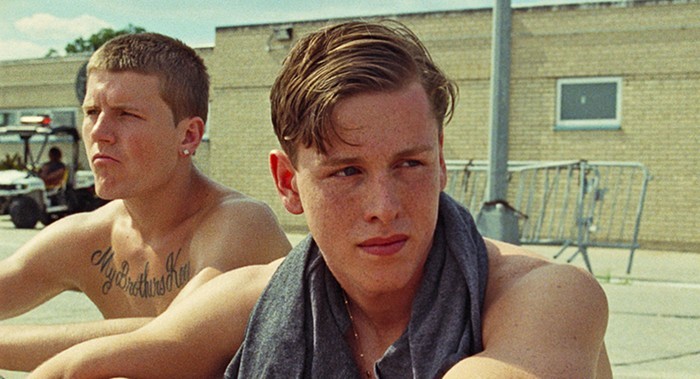Available on DVD Mon 5 Feb 2018
2017 was a strong year for tales of LGBT awakening. Moonlight and Call Me By Your Name received phenomenal acclaim, very healthy audiences, and awards nominations galore. Slightly removed from the mainstream are films like Eliza Hittman’s second feature Beach Rats, which focuses on Frankie (Harris Dickinson), a nineteen year-old idling his days away at the beach in Brooklyn. He spends his evenings liaising with older men for drugs and sex. The film deals with how he compartmentalises his life between his secret trysts and his daily life with his layabout friend, who wouldn’t take kindly to his night life.
Beach Rats isn’t a standard tale of sexual awakening. Filmed in gauzy 16mm, it’s more a poetic drift through a few weeks in the life of a young man. There’s no great revelatory love story, nor even any sense that any of the events may turn out to be pivotal to him, barring the death of his father through cancer. Rather, it’s a stylistic exercise in the rhythms of aimless youth. And stylish it is.
Perhaps it’s down to a female gaze, but through the lens of Hittman and director of photography Hélène Louvart (Pina, Ma Mère), the young bodies are as stripped of sexuality as they are of clothes. The camera does indeed linger on ripped abs and wiry muscle, but it feels very matter-of-fact; as inert as the lives of the characters. Even the scenes of nudity lack an erotic charge. Compare this with the way Barry Jenkins‘ lighting caresses the skin of his characters in Moonlight, or Tom Ford frames young men like Renaissance nudes in A Single Man, or even the problematic way Abdellatif Kechiche pours over his female stars in Blue is the Warmest Colour.
The young English actor Harris Dickinson (who has recently won Best Young British/Irish Performer Award at London Critics’ Film Awards) is totally convincing as Frankie. It’s a difficult role with so much internalised. It’s not unusual for young men to adopt a mode of studied taciturnity, especially those who’re intent on not giving away anything private, but there is certainly a risk a film character with that trait appearing blank or lifeless. Thankfully, Harrison pulls off this difficult balancing act, with Frankie’s conflict clear in his eyes. Counter-intuitively, when so much of the film is focussed on his physique, it’s also a performance free of vanity and he is the main reason to watch.
As admirable as the film is in its lack of sensationalism, and its arthouse sensibilities, it lacks a narrative drive, and book-ending the story with scenes of fireworks does little to get the pulse racing. There are viewers out there, especially those who are coming to terms with their own sexuality, for whom Beach Rats has resonated with the weight and clarity of a struck gong, and that’s wonderful. It does however, feel as aimless as its characters. As a snapshot of a very specific place and its inhabitants, there’s a certain vibrancy, but it’s ultimately a slightly empty experience.
